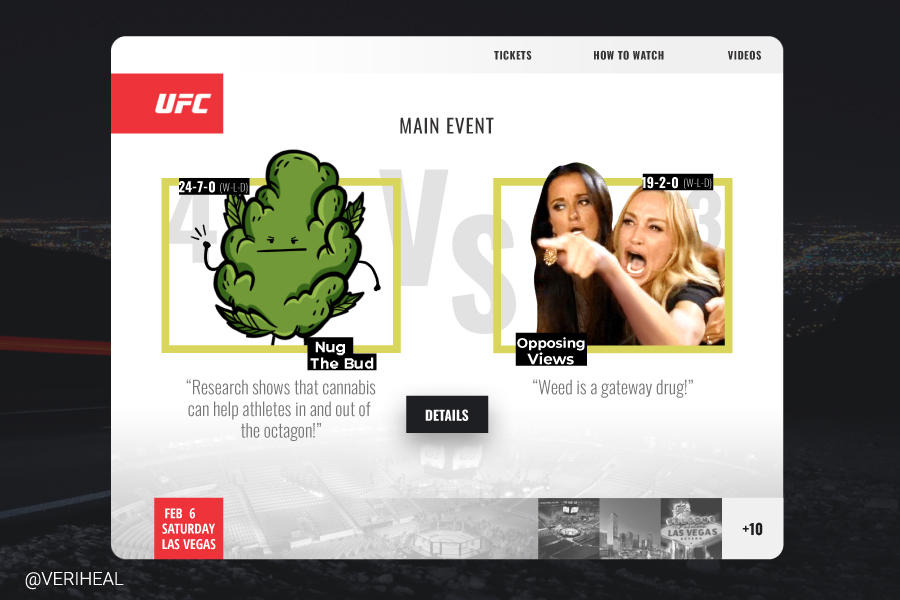Throughout the years, various professional sports leagues have frowned upon the use of cannabis by their athletes. Throughout time it has been the norm for players to be suspended or even removed from their positions when caught utilizing cannabis or when failing a drug test for cannabis. Renowned Olympic swimmer Michael Phelps was even removed of his gold medals after cannabis was found in his system. Although many of these athletes did not consume cannabis prior to games, fights, and other competitions but rather in their own free times, it did not matter as cannabis has been listed in many of the leagues’ anti-doping and drug policies since their inception. In recent years as more current and retired athletes have started to speak out regarding their cannabis use, as well as more states have legalized the plant on various levels, we have started to see some of these leagues make changes to their policies. The most recent announcement regarding changes to anti-doping and drug policies within major sports leagues comes from the UFC. The Ultimate Fighting Championship league announced on January 14th of 2021 that they had made several vital changes to their anti-doping policy, which included but was not limited to modifications regarding the handling of cannabis and other naturally occurring cannabinoid constituents within the plant.
What Has Changed in the UFC?
According to an official release on the UFC website, it was noted that athletes within the UFC that test positive over the threshold for THC will no longer be considered in violation of the UFC anti-doping policy. The only way that an athlete that tests positive for cannabis could be found in violation of this policy is if it could be proven without a doubt that they utilize cannabis intentionally as a performance enhancement substance. In addition to THC, the UFC has decided that all other naturally occurring phytocannabinoids are also no longer prohibited under their policy. This means that UFC fighters can utilize cannabinoid therapies such as those that include CBD without fear of violating the league’s policy.
A Statement Regarding the Changes
UFC Senior Vice President of Athlete Health and Performance Jeff Novitzky had the following to state regarding these changes.
“While we want to continue to prevent athletes from competing under the influence of marijuana, and we have learned that urinary levels of carboxy-THC are highly variable after out-of-competition use and have poor scientific correlation to in-competition impairment. THC is fat-soluble, meaning that once ingested, it is stored in fatty tissues and organs in the body and can be released back into the circulation, and consequently, carboxy-THC appears in the urine, sometimes long after ingestion. It is, therefore, not an ideal marker in athletes to indicate in-competition impairment.”
The UFC is Sparking the Conversation for Greater Change
This is a vital steppingstone in sparking the conversation at a greater level with various athletic regulatory commissions, which will hopefully lead to a broader change in the coming months and years. Earlier in 2021, the NBA also announced that they would no longer perform random drug screenings for THC during the 2021 season. In recent years other athletic leagues such as the Major League Baseball Association have made changes to their policies. In 2020, the MLB removed cannabis from its banned substances list freeing athletes from penalties for consumption.
Why You Should Get Your Medical Marijuana Card
Veriheal has satisfied millions of patients nationwide by giving them access to these benefits
- Larger purchase limits
- Peace of mind
- Enhanced legal protection
- Access to higher potency strains
- Save up to 25% on cannabis purchases
- Skip the line at the dispensary
Athletes That Have Come Forward
In case you have missed the headlines, let’s take a look at some of the athletes that have come out in support of cannabis and regarding their own consumption.
Riley Cote is a former pro hockey player and coach who is better known as “the enforcer.” His sister acquainted Riley with the benefits of cannabis at a young age as she utilizes it for treating Multiple Sclerosis. Riley himself has often spoken regarding his use of cannabinoid therapies to assist with pain, inflammation, reducing dependency on pharmaceuticals, and easing pre-game anxiety. He is also the co-founder of Athletes for Care and the founder of the HempHeals Foundation.
Kyle Turley, a former pro football player known for his positions with the New Orleans Saints and The St. Louis Rams, says that cannabis saved his life. He often speaks publicly regarding his use of cannabinoid therapies to treat chronic traumatic encephalopathy (CTE), a condition that is accompanied by neurological issues as well as chronic pain. He also helped bring to market a hemp-derived cannabis supplement known as Neuro XPF and sits on the board of a nonprofit designed to provide care to former NFL players called Gridiron Greats.
Other athletes that have spoken out in support of cannabis include but are not limited to Nick and Nate Diaz, Frank Shamrock, Ricky Williams, Ronda Rousey, and Liz Carmouche. We love to see more and more people coming out in support of this miraculous plant that is in a position to reach millions of individuals. We hope that through their words and the actions of leagues such as the UFC reforming their cannabis-related policies that it will help usher in more positive changes for the legality of cannabis globally in the coming years.
Author, Share & Comments















